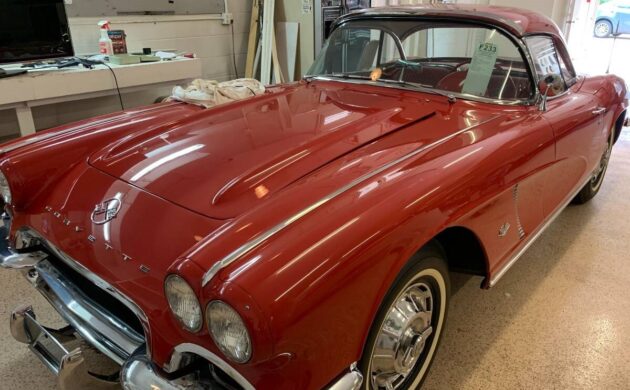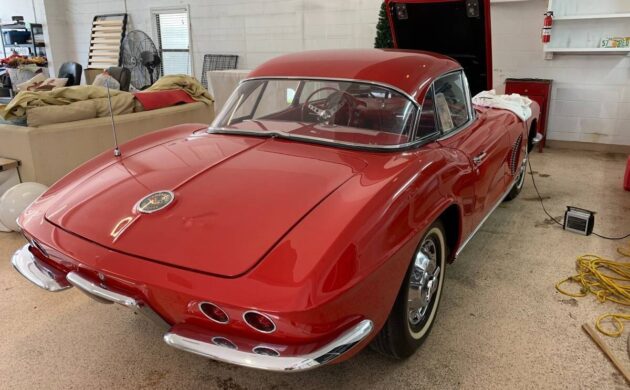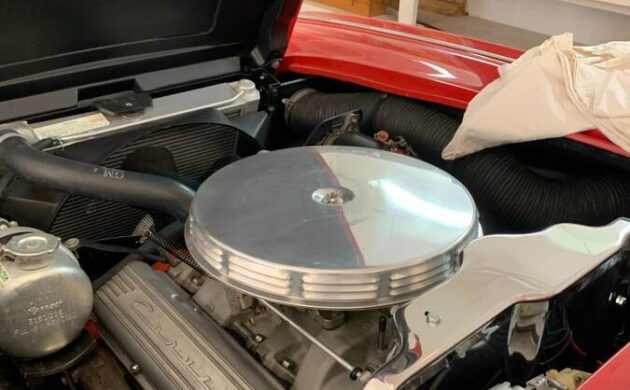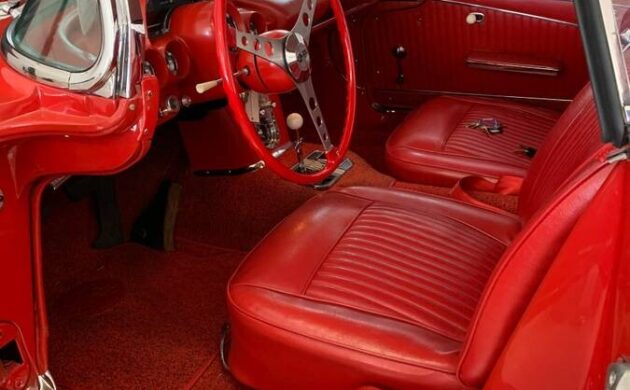The first generation of the Chevy Corvette enjoyed a 10-year run, and that would end in 1962. The all-new “C2” Sting Rays would debut the following year. This stunning ’62 Corvette has received a frame-off restoration, is numbers-matching, and has the rare 24-gallon fuel tank option. Located near Dayton Beach, Florida, this former Mecum auction auto is available here on craigslist for $119,900. Another great find by Pat L.!
Chevrolet’s Corvette got off to a rocky start in 1953, was available only with a six-cylinder engine, and sometimes sold as few as 300 copies in a year. But a 265 cubic inch V8 would soon become available and – with a styling update – the ‘Vette would finally become a financially viable product. It’s hard to tell some of the later C1 Corvettes without looking at the number of headlights – two in 1956-57 and then four every year thereafter. 14,531 copies were built in the C1 swan song year of 1962, with 4,412 having the 327 V8 that produced 340 hp as in the seller’s Chevy. A 4-speed manual is also on board.
From a note on the windshield, the seller’s Corvette either went to a Mecum auction and didn’t sell, or it did sell and the buyer has decided to flip the car. Mecum estimates the value of this rare and fully restored ‘Vette at between $125-150,000. It’s rare because it was only one of 65 copies built with the optional 24-gallon fuel tank. It was made of fiberglass to reduce weight, which was partly offset by the additional gasoline the car could carry. It was only available on Corvettes having the removable hardtop due to the need for room to accommodate the larger container.
You will have to use a magnifying glass to find any faults with this ’62 Chevy. At 65,000 miles (or earlier), it was completely redone but we don’t know how long ago that was. The car is red inside and out and comes complete with a Wonderbar radio. From the photos provided, the vehicle doesn’t seem to see much daylight these days and has a battery tender hooked up to its power source. Instead, the car is spending most of its time inside a garage sharing space with a sectional sofa. Do you concur with Mecum on the car’s potential value?








Beautiful car, but can’t believe that bigger tank is worth the extra thousands of dollars it’s going to take to buy it.
Seems like a fiberglas tank could result in gushing fuel in a fairly minor rear end crash, unlike metal. Not a good choice of materials.
The gas tank is quite safe, it’s mounted far from the rear of the car in C1 Corvettes.
53-62 Corvettes have there gas tank mounted behind the seats, under the compartment the soft top folds into when it’s down. Because of where the tank is, and how much bigger it was than the standard 16 gallon tank, cars with the big tank where only available with a hardtop (the soft top no longer fit in the compartment).
I would think the chances are slim of this being driven much at this price, so what might happen in an accident shouldn’t drive away a hypothetical ton of buyers.
Fiberglass fuel tanks do not work well with modern ethanol/gasoline. This has been a huge issue in the marine sector for years. Older fiberglass fuel tanks have been proven, in multiple independent studies, to degrade significantly (losing up t0 40% strength) and allow contaminates into engines resulting in major failure. Many boater have been forced to replace fiberglass fuel tanks, or scrap their boats.
It can be very difficult to completely avoid ethanol in gasoline. Many oil companies won’t guarantee that premium fuels don’t contain at least some ethanol at the pump. It is also worth noting that some gas stations may not always be honest about what they are pumping….
Was going to note the same. Good post.
I usually get REC-90 gas for my stuff around my house, but it is pretty hard to find at a gas station and is about a buck more than regular 83 gas.
I recall seeing fiberglass underground tanks at closed gas stations for conversion replacing the old metal tanks.
That’s true but the technology for fiberglass have advanced a lot since his car was built. Also, the tank you’re referring to are underground and that’s a prime location for rusting of steel tanks which doesn’t happen in fiberglass tanks. Not really comparing apples to apples.
Was this the same tank used in the ’63 Z06 “tanker” cars a year later? That was fiberglass also, but not sure of the capacity or if the C1 tank would fit the new C2 body.
No, 63-67 big tanks were 36 gallon, not 24, and were shaped completely differently.
I wonder why 65 buyers opted for this? Were they going racing or rallying or working for the precursor of Grub Hub? Another Corvette mystery.
Something is really a miss with this car. The 62 big tank Corvettes used a unique, and somewhat ugly fuel filler.
Corvettes with the standard tank had the fuel cap under the gas door, behind the driver’s door in the top front of the left rear quarter panel. Cars with the big tank came with an exposed chrome cap, mounted on a filler neck that came through a hole in the stock gas door. This was a set up that looked very much like the fuel cap found behind the driver’s door on 50’s pick up trucks. This car does not have the big tank filler neck and cap, leading me to wonder what gas tank is really in this car?
Over wise it looks like a pretty nice 62, but then I’m partial to them, especially Roman Red ones. I have one parked in my garage.
The second post in the link below, has a picture of the exposed filler neck and cap that came with the 24 gallon tank.
https://www.corvetteforum.com/forums/c1-and-c2-corvettes/2950531-rpo-488-help.html
And the Mecum sticker in the window does not mention big tank option either. If it was such a car, surely Mecum would have touted that in its marketing. Sounds like the seller does not really know what he has …
Interesting discussion about the fuel tank size. It certainly doesn’t fit the model of what other card with the large tank had. Does anyone know the reason for the different filler? It certainly looks rather ugly!
I can’t say for sure, but I assume there were multiple reasons.
First off, the big tank was really only intended for racing. The exposed cap would be easier and quicker to access and fill the tank with. The 24 gallon tank extended the car’s range, probably allowing it to race for over an hour between stops.
Also, because it was intended for racing, aesthetics weren’t a concern, or as important as functionality.
Finally, width wise the standard tank fills it’s compartment completely, putting the filler neck right up against the compartment behind the gas door. The big tank is as wide and almost twice as high as the standard tank, so it might be the only way it could be routed?
Unsafe at any speed.
I was a teenager in the 60’s and I can tell you that a 340 horse 327 engine was/is a BEAST. :-) Terry J
Prior to the mid-60’s to late in the decade, the 327/340 was a beast! For sure. The big blocks were quicker in the quarter, but were much harder to drive on the twisty. The 327 had a better balanced feel, even though the scales showed the actual front – rear weight distribution close to the same.
Now, at 75 yo, I would rather have a small block, the 400+ hp cars were a lot of work.
Real tankers are racers.
I have a 340 hp 62 that my father purchased new and picked up at the St Louis plant or to be more precise at a dealer across the street. When I acquired it in 84 it had a generic battery hold down “frame.” It was in a shop for a few years until, at 77, I felt I may never get to drive it again, so I brought it home. . The mechanic had ordered a stock battery hold down which has a “shield” on the side. Does anybody know the reason for this? Talked to a guy last weekend who has a 396 65 and he thinks it’s part of the ignition shielding, but that doesn’t make sense to me. Thanks.
@CeeOne- As I have mentioned too many times before- Spend $50 and join NCRS. If you live near an NCRS Chapter, join it. Your question would be answered in five minutes.
“@CeeOne- As I have mentioned too many times before- Spend $50 and join NCRS. If you live near an NCRS Chapter, join it. Your question would be answered in five minutes.”
I’ve been a member for years, I asked the question yesterday and so far no response.
Went to a show last night where there is usually a 62 and it was there, but no owner. Left a note on the windshield, but no response.
Frank I spoke too soon, there was a reply several hours ago and it’s a heat shield to protect the battery from the exhaust.
Maybe that is the owners living room!